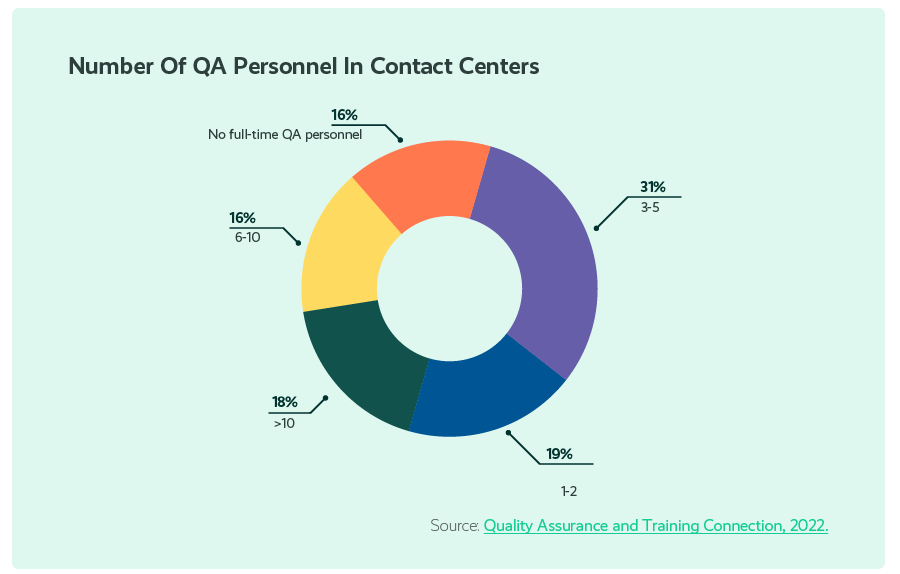9 Quality Analyst Skills To Look For When Hiring For Your Support Team
Managing a contact center comes with a slew of day-to-day challenges. Empowering agents and satisfying customers, all while maintaining exceptional levels of quality? It’s nothing short of a juggling act! However, there’s a clear path to success: Hire highly skilled quality assurance analysts who are dedicated to achieving your organization’s goals.
If you’ve recently established a quality assurance program for your customer experience team, it’s time to search for talented candidates to help you maintain and improve the business processes you’ve put into place. Your organization needs QA analysts to monitor the quality of your customer service support center. After all, providing a positive customer experience should be your bread and butter.
A 2022 survey by the Quality Assurance and Training Connection organization found that 16% of respondents said their customer service center had no QA employees. Every service center has to start somewhere, so it’s time to learn what to look for.

As you build an ideal quality assurance team, it’s important to determine what skills are needed for quality assurance workers and what their job duties entail to obtain peak performance in your contact center.
Quality Analyst Job Description
When determining the necessary quality analyst skills for your next hire, start by outlining their responsibilities. What will their day-to-day responsibilities be? How far along should they be in their career? How will their work advance your organization’s goals? Be sure to think both big-picture and detail-oriented.
So what does a quality analyst do? A quality analyst (also called a QA) is typically responsible for ensuring a great customer experience by reviewing metrics over time.
In addition to reviewing customer interactions, quality analysts are expected to:
- Monitor and analyze customer support trends
- Create criteria for agent performance measurement (QA scorecard)
- Assess agent performance over time
- Ensure that quality assurance standards are achieved
- Compile and analyze statistical data, including KPIs
- Identify strategies to implement improved internal processes
- Draft and execute quality assurance policies and procedures
When hiring quality assurance professionals for your support team, it’s important to remember the impact they can have. While they may not be on the front lines, their work has a meaningful ripple effect across your organization and the customer experience.

Top 9 Quality Analyst Skills To Look For
Now that you’ve determined the responsibilities of the quality assurance role, it’s time to hire your quality assurance workers. Let’s review what quality assurance skills are necessary to look for when hiring an analyst for your support team.
1. A Quick Learner
A good QA analyst needs to have a global overview of the company. They must learn the procedures that agents follow and the SLA agreements in place, and they should have a complete understanding of the QA process and procedures established. Beyond that, they need a strong awareness of the QA landscape — including best practices — so they can identify gaps and opportunities for improvement.
This can be an overload of information for some, but a strong quality assurance professional won’t be overwhelmed. They’ll be eager to dive in and become experts, which is why you need someone who can learn a large amount of information fast.
Don’t forget: The faster they can get up to speed, the faster they can start to make a real difference in your company’s bottom line. It is only by learning about all the procedures in place, from a customer’s first reaction to resolution and everything in between, that they will perform at maximum capacity and demonstrate strong ROI right out of the gate.
2. Meticulous Attention To Detail
Quality assurance analysts will listen to calls and review digital customer service interactions like those in chat, email, and social media to monitor the overall customer experience within your organization.
It’s easy to gloss over issues while reviewing hundreds of calls and emails, so it’s important to look for someone who pays attention to detail. A strong quality assurance professional needs to pick out the good and the bad from the vast amount of information they’ll be processing regularly.
They need to be able to consume many details to note patterns in quality, identify quality errors, and spot the positive and negative nuances in how agents handle interactions. Furthermore, as they note what makes the customer experience extraordinary, they will be able to suggest additional small details that could make the experience even better.
Your QA analyst must be able to catch the details that make all the difference. This is where quality assurance processes and quality assurance skills unite.
3. Analytical
Sounds obvious with “analyst” in the “quality assurance analyst” title, right? But it’s worth repeating because this skill is crucial for success. To put all the collected data to good use, quality assurance analysts need to be able to spot trends within the data.
Whether these details involve things going well, areas that need improvement, or surging customer trends, a QA analyst is the go-to person to spot them. An excellent quality assurance analyst can also spot quality errors and use metrics and data to navigate solutions.
4. Good Coaching And Verbal Communication
A strong QA analyst has to be a people person. Not only are quality assurance workers performing quality monitoring, but they are the glue between management and frontline staff. They make sure the entire organization stays aligned.
A key quality analyst skill is confidence in communication. In their role, they must facilitate communication between management and frontline staff, while also taking on the role of being a coach. QA analysts work directly with frontline agents to improve customer service faux pas and recognize a job well done. They must be comfortable giving constructive feedback without hurting anyone’s feelings. After all, agent empowerment is always a bonus in the contact center!
5. Good Written Communication
Similar to possessing great verbal communication skills, being skilled in written communication is important for almost any position in a contact center. But for quality assurance workers, the ability to craft positive, informative, and brief written communication is crucial.
Fortunately, written communication is a skill that can be taught. Good written communication can be part of your QA analyst development. One way to ensure your QA employees are continuing to work on their writing skills is by rewarding them when they draft a particularly thought-out response. Training can be a game-changer for communication.
6. Empathetic And Emotionally Intelligent
Over 90% of customers in recent surveys indicate they would switch to a competitive company if they have a bad customer service experience. On the positive side, over 60% indicate they are willing to pay more for outstanding customer service.
So for these reasons, it’s important to hire quality assurance analysts who practice empathy and use strong emotional intelligence. They will be more apt to notice quality errors in the empathy and EQ realms.
Your ideal QA analyst understands multiple angles and can work with everyone to provide positive results. Having the power to understand someone’s situation is important, as they will better understand the “why” behind agents’ actions, customer satisfaction, and management procedures.
By being able to empathize with everyone, QA analysts can better collaborate across the spectrum.

7. Ability To Work As Part Of A Team
Teamwork feeds the company culture. And a positive company culture creates huge bottom-line benefits. With increased collaboration within the workplace, contact centers are likely to experience engaged employees, higher talent retention rates, and increased velocity and profitability.
With widespread teamwork, employees are more likely to work hard and embrace challenges that take them to the next level. Analysts with great teamwork skills will know when to ask for help and know where collaboration should be leveraged.
It’s a bonus if an employee has leadership qualities to lead and guide their team or assist a struggling coworker. Even if you only have one quality assurance employee, teamwork skills are still valuable when they venture outside of their department.
8. Goal-Oriented
Being a great goal setter is a quality analyst skill that will go a long way in your contact center. Having a QA worker with the ability to set and accomplish goals is not only beneficial to the support team but also to the company as a whole.
When quality assurance workers are focused on their goals, they’ll work to expand their skill sets and develop in their careers. While all QA employees might share goals, setting individual goals that are tailored to each analyst will provide additional motivation. Most importantly, when they understand and align with the company’s goals, your quality assurance analysts can be laser-focused on solutions.
9. Belief In The Company’s Mission And Vision
If an employee believes in a company’s mission and vision, they’re much more likely to enjoy their scope of work and remain dedicated to their role. Mission and vision statements can give quality assurance analysts a goal to work toward and a clear understanding of the company’s overall purpose.
If your employees don’t understand or buy into the mission, the company will have a harder time being successful. The mission statement and values of the company should be something your employees truly connect with and are constantly working toward achieving.
You’re Ready To Hire A Quality Assurance Analyst
Finding the right quality assurance candidate may not come easy, but if you have the patience and perseverance, you’ll find them. Look carefully over each applicant and learn how to spot the quality analyst skills you’re looking for. But most importantly, ask the right questions, review the necessary QA skillset, and listen to your intuition when interviewing.
If you’re ready to move beyond quality assurance, request a demo for effortless digital service operations with Playvox Quality Management.






